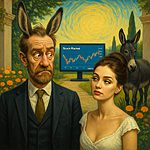The Power of Rational Thinking: Navigating the Waves of Mass Psychology
Feb 11, 2025
The Power of Rational Thinking: Breaking Free from the Herd
In a world driven by emotion, hype, and manipulation, rational thinking is both a weapon and a shield. The ability to cut through noise, analyze data, and make independent decisions is the difference between being a master of your fate or a pawn in someone else’s game. As Socrates said, “The unexamined life is not worth living.” In today’s world, an unexamined mind is a liability.
Mass Psychology: The Invisible Hand Guiding the Crowd
The bandwagon effect isn’t just a psychological quirk—it’s a force that moves markets, topples governments, and fuels social movements. Robert Cialdini nailed it: “We view a behaviour as correct in a given situation to the degree that we see others performing it.” The herd follows trends, obeys impulses, and rarely questions the narrative. History has repeatedly shown that mass psychology can build empires or burn them to the ground.
Humans evolved to conform—it was once necessary for survival. But in an age of social media manipulation, propaganda, and echo chambers, the evolutionary instinct to follow the crowd is being exploited. The Fear of Missing Out (FOMO) is not just a feeling; it’s a billion-dollar industry. Rational thinkers recognize this, dissect trends and refuse to be puppets on strings.
The Rebel’s Edge: Thinking for Yourself
Marcus Aurelius understood it centuries ago: “The universe is change; our life is what our thoughts make it.” True power lies in questioning everything, challenging assumptions, and seeking evidence over opinion. Rational thinking isn’t about blind contrarianism—it’s about refusing to accept claims without proof, resisting emotional manipulation, and valuing facts over feelings.
In the 21st century, independent thought is a survival skill. It’s about cutting through misinformation, seeing through hype, and making decisions based on logic, not hysteria. The challenge isn’t avoiding influence altogether—it’s developing the mental toughness to recognize and resist irrationality when it counts.
Rational Thinking: The Blueprint for Mastery
Rational thinking is a cold, hard analysis. It’s the relentless pursuit of truth, grounded in evidence and logic. Warren Buffett says, “Risk comes from not knowing what you’re doing.” It’s not about luck—it’s about stacking the odds in your favor through disciplined reasoning.
This isn’t just about making good decisions—it’s about avoiding catastrophic ones. Richard Feynman’s warning is crucial: “The first principle is that you must not fool yourself – and you are the easiest person to fool.” Rational thinking forces self-awareness, eliminating the delusions that cloud judgment.
The Antidote to Chaos: Relentless Objectivity
Rational thinking is a ruthless filter. It discards emotion-driven nonsense, exposes cognitive biases, and demands intellectual discipline. Bertrand Russell’s insight has never been more relevant: “The fundamental cause of trouble in the world today is that the stupid are cocksure while the intelligent are full of doubt.” The ability to question one’s own certainty is a mark of true intelligence.
Mastering rational thinking means understanding how to separate fact from fiction and reality from illusion. It means recognizing how emotion, bias, and herd mentality distort perception. It means making decisions based on truth, not pressure.
The world rewards those who think independently and punishes those who blindly follow. The choice is simple: be the architect of your destiny or a casualty of the herd.
Example of Rational Thinking in Action
To illustrate rational thinking in action, consider the following scenario: Sarah, a marketing executive, is presented with two potential advertising strategies for an upcoming product launch. Sarah evaluates the options using rational thinking rather than relying solely on instincts or personal preferences. As the renowned psychologist Daniel Kahneman wisely noted, “A reliable way to make people believe in falsehoods is frequent repetition because familiarity is not easily distinguished from truth.”
Sarah carefully analyzes the target audience, market research data, and cost projections, considering each strategy’s potential benefits and drawbacks. She consults diverse perspectives, heeding the advice of the great philosopher Aristotle: “It is the mark of an educated mind to be able to entertain a thought without accepting it.” After weighing all available evidence through reason and logic, Sarah makes an informed decision, selecting the plan that best aligns with the company’s goals and objectives.
This exemplifies the essence of rational thinking – a conscious effort to overcome cognitive biases and subjective impulses, favouring a reasoned analysis grounded in empirical data and sound argumentation instead. As the influential economist John Maynard Keynes eloquently stated, **”When the facts change, I change my mind. What do you do, sir?” Rational thinking empowers individuals to adapt their perspectives in the face of new evidence, fostering a growth mindset and enabling well-informed decision-making.
The Importance of Rational Thinking
Rational thinking is not an abstract concept; it’s a critical tool for survival and success. Here’s why it matters:
Sharper Decision-Making
Every day, we make countless decisions—some trivial, others life-changing. Data from the National Bureau of Economic Research indicates that emotionally driven financial decisions cost investors billions annually. Rational thinking ensures choices are based on objective analysis rather than knee-jerk reactions.
Eliminating Cognitive Biases
The human brain is wired with biases—confirmation bias, availability heuristics, and anchoring traps. A 2019 study published in the Journal of Behavioral Decision-Making found that bias-driven decisions are 40% more likely to result in negative outcomes. Rational thinkers identify and neutralize these mental traps.
Enhanced Problem-Solving
Rational thinking forces structured problem-solving. MIT research on decision trees and logical frameworks demonstrates that those trained in systematic reasoning solve complex problems 30% faster and more accurately than those who rely on intuition.
Better Conflict Resolution
Irrationality fuels division. A 2021 Harvard study on negotiation found that disputes resolved through factual, logic-based discussion resulted in 65% higher satisfaction rates than those dominated by emotional arguments. Rational thinking prioritizes solutions over ego.
Superior Analytical Skills
From scientific breakthroughs to market analysis, rational thinking sharpens pattern recognition and logical deduction. Studies by the Cognitive Neuroscience Society highlight that individuals who engage in critical thinking exercises improve analytical processing speed by up to 27%.
Objectivity Over Emotion
Emotions are unreliable guides. Stanford’s neuroscientific research shows that decisions made in highly emotional states are twice as likely to result in regret. Rational thinkers extract emotion from decision-making, prioritizing facts and reality.
Strengthening Critical Thinking
Critical thinking and rationality go hand in hand. The ability to challenge assumptions, assess arguments, and filter noise from valuable information is essential. According to the Foundation for Critical Thinking, societies that emphasize rational discourse experience lower levels of misinformation-driven crises.
Long-Term Strategic Planning
Impulsivity is the enemy of long-term success. Rational planning allows individuals to anticipate challenges, weigh pros and cons, and build sustainable strategies. Data from the Harvard Business Review confirms that organizations relying on rational strategy frameworks outperform reactive ones by 45% over a decade.
Intellectual and Personal Growth
Rationality fuels curiosity. Rational thinkers seek knowledge, welcome diverse perspectives, and continually refine their worldviews. Growth is a byproduct of intellectual discipline.
Adaptability in an Uncertain World
The world is unpredictable, but rational thinking builds resilience. Those who adapt logically rather than emotionally navigate crises more effectively. A study from the American Psychological Association found that individuals trained in logical problem-solving exhibit 23% greater resilience in high-stress situations.
The evidence is undeniable. Rational thinking is not a luxury—it’s a necessity. Master it, or be at the mercy of those who have.
Master Rational Thinking: The Game-Changer
Rational thinking sharpens decision-making by prioritizing logic over emotion. Elevate your cognitive game with these precision strategies:
- Question Everything – Challenge assumptions and break free from blind spots.
- Demand Evidence – Trust data, not opinions. Verify sources and analyze critically.
- Expose Biases – Spot cognitive traps and neutralize their influence.
- Think in Alternatives – Consider multiple explanations before locking in conclusions.
- Pause & Reflect – Step back, assess objectively, and refine your logic.
- Leverage Tools – Use frameworks like cost-benefit analysis for smarter choices.
Master this, and you don’t just think—you dominate decisions.
The Unbreakable Link: Emotional Intelligence & Rational Thinking
Pure logic without emotional mastery is fragile. True rationality requires emotional intelligence (EQ) to refine judgment, minimize bias, and execute decisions with precision. Master these pillars:
- Self-Awareness: Control the Battlefield – Recognize emotional interference. Acknowledge cognitive distortions before they hijack your logic.
- Empathy: Decode the Opponent – Understanding others’ emotions reveals hidden motives, sharpening strategic analysis.
- Emotional Regulation: Steel Nerves Under Fire – Master impulse control. Emotional steadiness separates calculated moves from reckless reactions.
- Social Finesse: The Power of Influence – Rational thought is wasted if poorly communicated. EQ refines persuasion, negotiation, and leadership.
Conclusion: Think Like a Mastermind
Rational thinking isn’t just about facts—it’s about wielding logic with tactical precision. By questioning assumptions, demanding evidence, and leveraging emotional intelligence, you transform from a passive thinker to a calculated strategist. The world is a battlefield of ideas—arm yourself with reason, sharpened by EQ, and seize control of every outcome.
Confucius warned, “Real knowledge is to know the extent of one’s ignorance.” The rational mind never assumes mastery—it relentlessly seeks truth, refining itself through doubt and discovery. Jonathan Swift echoed this when he observed, “Reasoning will never make a man correct an ill opinion, which by reasoning he never acquired.” The challenge, then, is not just thinking critically but dismantling the illusions masquerading as logic.
Michel de Montaigne, the Renaissance thinker, understood that wisdom thrives in uncertainty: “The most certain sign of wisdom is cheerfulness.” The rational mind does not merely tolerate ambiguity—it thrives in it, adapting, recalibrating, and remaining unmoved by fear or impulse.
To think rationally is not to strip life of emotion but to harness it—fusing reason with insight, calculation with empathy, strategy with adaptability. This mindset is that of pioneers, visionaries, and conquerors of thought. The choice is yours: be a spectator in the game of ideas or master the art of reason and shape the world around you.















